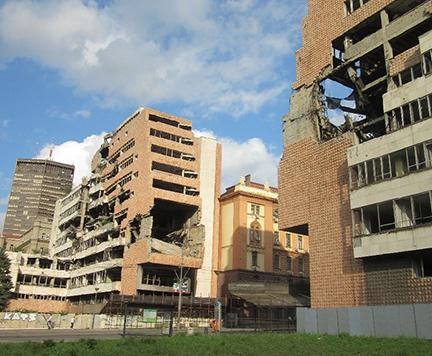Gruia Badescu
Year submitted: 2017
Supervised by: Prof Wendy Pullan
This dissertation discusses the rebuilding of cities after war in the context of the changing character of warfare and the increased expectations for societies to deal with difficult pasts. Departing from studies that approach post-war reconstruction focusing on the functional dimension of infrastructural repair and housing relief or on debates about architectural form, this dissertation examines reconstruction through the lens of the process of ‘coming to terms with the past’. It explores how understandings of victimhood and responsibility influence the rebuilding of urban space. Conversely, it argues that cities and architecture, through the meanings ascribed to them by various actors, play an important role in dealing with the past.
Building on the moral philosophy of Theodor Adorno and Hannah Arendt, it discusses the potential of reconstruction to work through the past, then engages with frictions highlighted by three situations of rebuilding after different types of war. First, it examines the rebuilding of Belgrade as the capital of socialist Yugoslavia after the aerial bombings typical of the Second World War. Second, it analyses reconstruction debates in the same city after the 1999 NATO bombings, a high-tech operation, framed by NATO as a preventative, humanitarian intervention against a ‘perpetrator’ state. Third, it discusses rebuilding processes in Sarajevo, where destruction was inflicted between 1992 and 1995 by actors internal to the country, albeit with international ramifications, exemplary of Mary Kaldor’s ‘new wars’. Based on thirteen months of fieldwork conducted in Belgrade and Sarajevo between 2012 and 2015, it analyses intentions and consequences of reconstruction acts. It suggests the potential and the challenges of a reflective reconstruction, which engages critically with the past, and of a syncretic place-making reconstruction, which focuses on place and its agonistic promise. Its main contribution is to highlight the essential relationship between reconstruction and coming to terms with the past, arguing for an understanding of reconstruction with regards to conflict itself.


